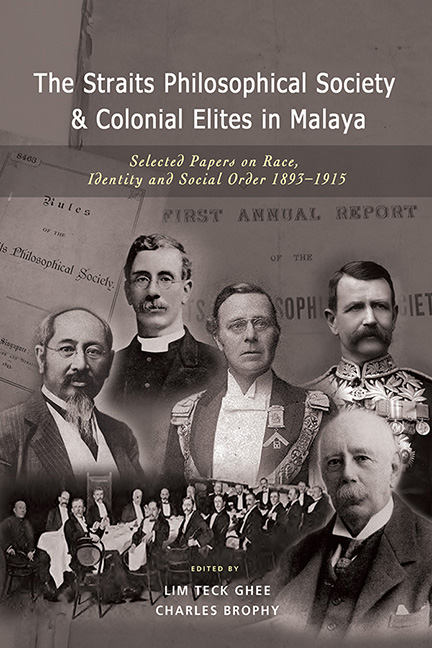 The Straits Philosophical Society and Colonial Elites in Malaya
The Straits Philosophical Society and Colonial Elites in Malaya Published online by Cambridge University Press: 09 January 2024
In the aftermath of the First World War, the intellectual life of the colony began to change. Many of the European members would go off to fight in the war and would not return. At the same time, one of the Society’s most prominent members, Lim Boon Keng would leave the colony for China in 1921. He was increasingly dissatisfied with the lack of opportunities for Straits Chinese and the British inability to treat them as free men within the British Empire. As Lim would earlier argue in 1917,
Surely this war must have taught us this lesson—that in dealing with human beings we must look at the spirit, we must look at the total of a man’s character and culture, and not merely at a man’s skin. … I think, that in this colony we shall always maintain that great British spirit which we have inherited from Sir Stamford Raffles that in this colony we shall treat all men as men, not by the colour of their skin but by their character, their merits and their qualities as useful citizens.
This built upon Lim’s calls during the war to challenge racial discrimination within the British Empire and for the movement of colonized towards democratic self-government within a reformed Empire, as a first step towards a “federation of the world”. Yet Lim’s belief in the promise of British Liberalism, and hope that the British Empire could transcend racial discrimination, diminished. Nor did the promise of the smooth integration of Anglicized elites within the colonial establishment realize a harmonious colonial order.
By the 1920s new challenges and claims were being made against the colonial order in Malaya, and a colony that had earlier been seen as devoid of politics was increasingly becoming politicized. The earlier decades of the Society had seen a more tranquil political climate in the colony in which questions of colonial policy could be openly debated in a more non-partisan manner. In the aftermath of the war, questions of the future of Malaya became more urgent, and a new series of claims emerged which challenged the stability of the old order with stronger rhetoric.
To save this book to your Kindle, first ensure [email protected] is added to your Approved Personal Document E-mail List under your Personal Document Settings on the Manage Your Content and Devices page of your Amazon account. Then enter the ‘name’ part of your Kindle email address below. Find out more about saving to your Kindle.
Note you can select to save to either the @free.kindle.com or @kindle.com variations. ‘@free.kindle.com’ emails are free but can only be saved to your device when it is connected to wi-fi. ‘@kindle.com’ emails can be delivered even when you are not connected to wi-fi, but note that service fees apply.
Find out more about the Kindle Personal Document Service.
To save content items to your account, please confirm that you agree to abide by our usage policies. If this is the first time you use this feature, you will be asked to authorise Cambridge Core to connect with your account. Find out more about saving content to Dropbox.
To save content items to your account, please confirm that you agree to abide by our usage policies. If this is the first time you use this feature, you will be asked to authorise Cambridge Core to connect with your account. Find out more about saving content to Google Drive.